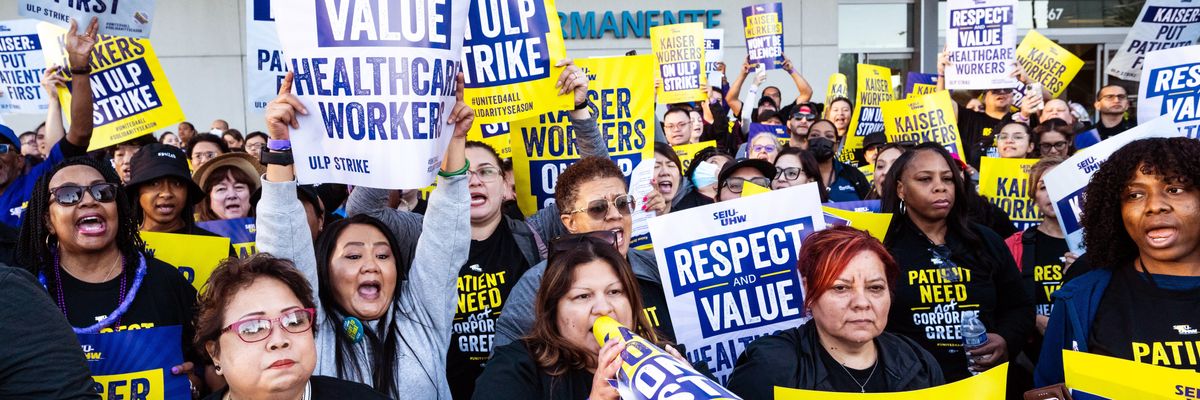The largest healthcare worker strike in U.S. history entered its second day on Thursday with the backing of progressive members of Congress, who voiced solidarity with Kaiser Permanente employees in their fight for better wages and an end to chronic understaffing at facilities across the country.
"Safe staffing levels and living wages are critical to delivering high-quality healthcare to the millions of Californians covered by Kaiser," Rep. Barbara Lee (D-Calif.), a 2024 U.S. Senate candidate, wrote on social media Wednesday, calling on Kaiser management to "bargain in good faith."
Other prominent lawmakers in the House and Senate—including Sens. John Fetterman (D-Pa.) and Bernie Sanders (I-Vt.) and Reps. Cori Bush (D-Mo.), Ro Khanna (D-Calif.), and Katie Porter (D-Calif.)—also voiced support for the striking workers.
"During the height of Covid, we all said that healthcare workers were absolutely essential and we applauded them for their bravery and courage," Khanna said in a video message. "Now it's time we have their back to make sure that they're paid fairly and treated with respect."
Sanders, the chair of the Senate Health, Education, Labor, and Pensions Committee, wrote that "if Kaiser can afford to pay its CEO over $15.4 million it can afford to treat all of its workers with respect."
"Whether you work in a hospital, or behind a desk, or on an assembly line, your fight is our fight."
More than 75,000 Kaiser workers—including nurses, pharmacists, radiology technicians, and call center representatives—walked off the job early Wednesday in California, Colorado, Oregon, and other states after around six months of contract negotiations that did not produce an acceptable agreement. The previous contract expired on September 30.
While the walkouts are expected to end Saturday morning, the coalition of unions that represents the striking workers has said it is prepared to launch a bigger and longer strike next month if the company continues engaging in unfair labor practices and refusing to meet core wage and staffing demands.
Understaffing at Kaiser has resulted in delays in patient care and left workers feeling burnt out and overwhelmed. And low pay in areas with high costs of living has forced some healthcare workers to sleep in their cars as Kaiser—a nonprofit that benefits hugely from tax exemptions—rakes in billions.
"Frontline healthcare workers are awaiting a meaningful response from Kaiser executives regarding some of our key priorities including safe staffing, outsourcing protections for incumbent healthcare workers, and fair wages to reduce turnover," Caroline Lucas, a spokesperson for Coalition of Kaiser Permanente Unions, said in a statement late Wednesday.
"Healthcare workers within the coalition remain ready to meet at any time," said Lucas. "Currently, the strike continues, and there are no sessions scheduled at this hour."
The striking Kaiser employees are among the more than 400,000 U.S. workers in a range of sectors who have walked off the job this year in pursuit of better pay, benefits, and conditions.
The United Auto Workers (UAW), which is currently striking at the Big Three U.S. car manufacturers, celebrated the Kaiser strike as part of a broader working-class fight for justice.
"Today, we stand in solidarity with the 75,000 members of our union family who are on strike at Kaiser," UAW president Shawn Fain said Wednesday. "Whether you work in a hospital, or behind a desk, or on an assembly line, your fight is our fight. We all deserve dignity on and off the job. We all deserve a future for our families and our communities. We all deserve our fair share of the economy that we, as working people, create and run. To our union family on strike at Kaiser, the UAW has your back."
